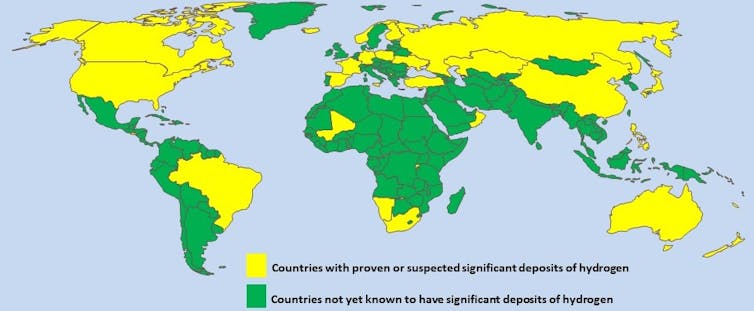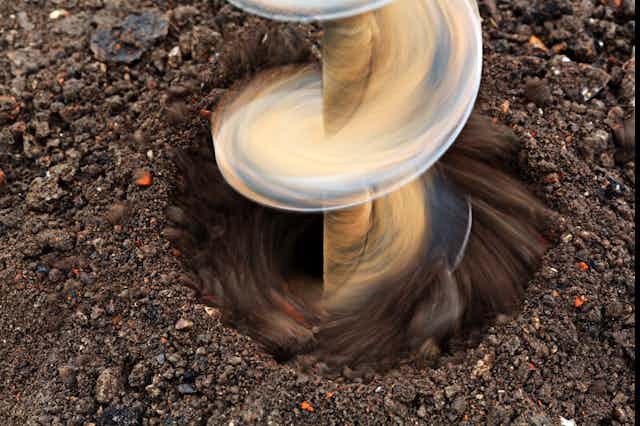Hydrogen will play a role in weaning us off fossil fuels. It can be used to power trains, planes and HGVs, as well as being a low-carbon alternative to coke in steelmaking and a way to warm our homes.
But where will we get it? The latest geological research suggests that cheap and plentiful supplies of naturally occurring hydrogen could be found right under our feet – although there’s a long way to go before we can say for sure how useful these stores of “gold” hydrogen will be.
The many ways to obtain hydrogen have an informal, colour-based naming scheme. At present, most of our supplies are “grey” hydrogen, which is made from natural gas. Grey hydrogen does nothing to reduce the climate impact of fossil fuels, because carbon dioxide is produced as a waste product and dumped into the atmosphere.
However, when this waste is captured and buried, what’s then known as “blue” hydrogen is a big improvement. It will allow rapid and relatively climate-friendly growth in hydrogen production in the short term.
In the future, we’ll use excess electricity from solar and wind farms to perform electrolysis – the electrical breaking up of water into the hydrogen and oxygen it’s made from. This “green” hydrogen is currently more expensive than blue hydrogen and is not yet widely exploited. But that is changing rapidly as governments around the world find ways to encourage it. There’s also “pink” hydrogen, made using nuclear energy.
Now a new hydrogen hue has appeared: gold (also sometimes known as white). Gold hydrogen is naturally occurring gas trapped in pockets under the ground – in much the same way as oil and natural gas. The question is: will any of these deposits (which are being found all over the world) be large enough to justify the cost of the drills, pipelines and so on that are needed to extract them?

Nature’s hydrogen
Geologists have long known that hydrogen is produced underground by the chemical reaction of iron-rich rocks with water, or when water breaks up by exposure to radioactive minerals.
But, because hydrogen molecules are small and light, they easily percolate through rock and escape into the atmosphere. Hydrogen also serves as a food source for many microorganisms. Consequently, natural underground deposits of the gas were assumed to be small and rare – and so, with the exception of some work done decades ago in the Soviet bloc, few attempts have been made to look for it. And if you don’t look, you don’t find.
Now, however, geologists are starting to look and large amounts of natural hydrogen are turning up all over the place. In October 2023, researchers at the French National Centre of Scientific Research discovered a particularly large reservoir of natural hydrogen in north-eastern France’s Lorraine coal basin. The reservoir may contain 250 million tonnes of naturally occurring hydrogen – enough to provide almost as much energy as the UK’s largest oil field (the Claire field, west of Shetland).
Smaller hydrogen reservoirs have been found in Spain and across Europe, as well as in Mali, Namibia, Brazil, the US and many other countries. So far there’s nothing in the UK, but geologists are starting to think about where to look.
Global distribution of suspected natural hydrogen deposits

Pros and cons
There’s much to learn before we’ll know if gold hydrogen could have a significant impact on the transition away from fossil fuels. Geologists need to understand better how and where hydrogen gas forms, how it migrates to the places it becomes trapped, and how long it stays there before leaking out or being consumed by microorganisms.
But there are clear benefits to exploiting this low-cost, low-impact energy source. The science and technology needed is similar to that already used by oil and gas firms so jobs, resources and knowledge could be redeployed.
That would help launch the “hydrogen economy” we need as part of a strategy to halt anthropogenic climate change. This will be true even if the deposits turn out to be very limited and, hence, merely a stopgap while we develop enough renewable electricity capacity to make green hydrogen viable.
There are downsides too. Exploiting natural hydrogen deposits could be used as an excuse to foot-drag on the need to cut greenhouse gas emissions immediately. We’ve seen this already with carbon capture and storage. Will gold hydrogen suffer the same fate of being unfairly pilloried because of over-hype by actors with a hidden agenda (namely some politicians and lobbyists)?

Another problem is that hydrogen exploration may accidentally lead to new discoveries of fossil fuel. For example, many of the known deposits of gold hydrogen also contain methane, which may need to be separated from the hydrogen and then reburied.
It’s also very hard to tell whether a possible subsurface “trap” contains oil, natural gas, hydrogen or just salt water. The ultimate test is to drill and see what’s there. But if a possible hydrogen field turns out to contain crude oil, how do we ensure it’s left in the ground?
The big question, though, is how seriously to take gold hydrogen. Will it turn out to be an over-hyped distraction of very limited utility? Or will it provide a pain-free path into a low-carbon future? The truth probably lies between these extremes, but only time (and further research) will tell us.

Don’t have time to read about climate change as much as you’d like?
Get a weekly roundup in your inbox instead. Every Wednesday, The Conversation’s environment editor writes Imagine, a short email that goes a little deeper into just one climate issue. Join the 30,000+ readers who’ve subscribed so far.

